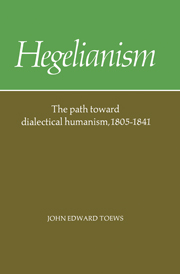Book contents
- Frontmatter
- Contents
- Preface
- Introduction: the Hegelian project in ideological perspective
- PART I PHILOSOPHY AND CULTURAL INTEGRATION: HEGEL IN CONTEXT
- PART II THE HISTORICAL APPROPRIATION OF THE ABSOLUTE: UNITY AND DIVERSITY IN THE HEGELIAN SCHOOL, 1805–1831
- 4 Hegel and Hegelianism: disciples and sympathizers in the formation of the Hegelian school
- 5 Hegelian politics during the Restoration: accommodation, critique, and historical transcendence
- 6 Christian religion and Hegelian philosophy during the Restoration: accommodation, critique, and historical transcendence
- PART III THE REDUCTION OF THE ABSOLUTE TO “MAN”: THE DIVISION OF THE SCHOOL AND THE EMERGENCE OF THE HEGELIAN LEFT, 1830–1841
- EPILOGUE: BEYOND “MAN” – THE RISE AND FALL OF LEFT HEGELIAN HUMANISM
- Notes
- Bibliography
- Index
6 - Christian religion and Hegelian philosophy during the Restoration: accommodation, critique, and historical transcendence
Published online by Cambridge University Press: 08 January 2010
- Frontmatter
- Contents
- Preface
- Introduction: the Hegelian project in ideological perspective
- PART I PHILOSOPHY AND CULTURAL INTEGRATION: HEGEL IN CONTEXT
- PART II THE HISTORICAL APPROPRIATION OF THE ABSOLUTE: UNITY AND DIVERSITY IN THE HEGELIAN SCHOOL, 1805–1831
- 4 Hegel and Hegelianism: disciples and sympathizers in the formation of the Hegelian school
- 5 Hegelian politics during the Restoration: accommodation, critique, and historical transcendence
- 6 Christian religion and Hegelian philosophy during the Restoration: accommodation, critique, and historical transcendence
- PART III THE REDUCTION OF THE ABSOLUTE TO “MAN”: THE DIVISION OF THE SCHOOL AND THE EMERGENCE OF THE HEGELIAN LEFT, 1830–1841
- EPILOGUE: BEYOND “MAN” – THE RISE AND FALL OF LEFT HEGELIAN HUMANISM
- Notes
- Bibliography
- Index
Summary
THE APPROPRIATION OF HEGEL'S PHILOSOPHY OF RELIGION BY THE “OLD” HEGELIANS
In the introduction to his Lectures on the Philosophy of Religion, Hegel claimed that his speculative philosophical elevation of religious faith and dogmas to the sphere of rational knowledge and truths did not constitute an attempt to instill a new religion into the minds of those who were without faith, but simply provided a conceptual understanding of the religious faith that the members of his audience already possessed. But Hegel also insisted that the religious form of the relationship between man and the divine was no longer satisfactory for modern consciousness. ‘The spirit of the time, ’ he wrote in 1822, ‘has developed to a stage where thinking, and the way of looking at things that goes together with thinking, has become an imperative condition for consciousness in defining what it shall admit and recognize as true. ’ If contemporary man was to attain assurance of salvation, the blessedness of immortality, the content of his former faith would have to take the form of philosophical truth:
The absolute content of religion is essentially here and now for spirit. Consequently, it is … only in the speculative knowledge of that content that spirit, which requires something more than simple faith, can find a truth that is freely accessible to it here and now and that alone is capable of satisfying its eternal need, namely, to think, and so to endow the infinite content of religion with its infinite form.
- Type
- Chapter
- Information
- HegelianismThe Path Toward Dialectical Humanism, 1805–1841, pp. 141 - 200Publisher: Cambridge University PressPrint publication year: 1981



